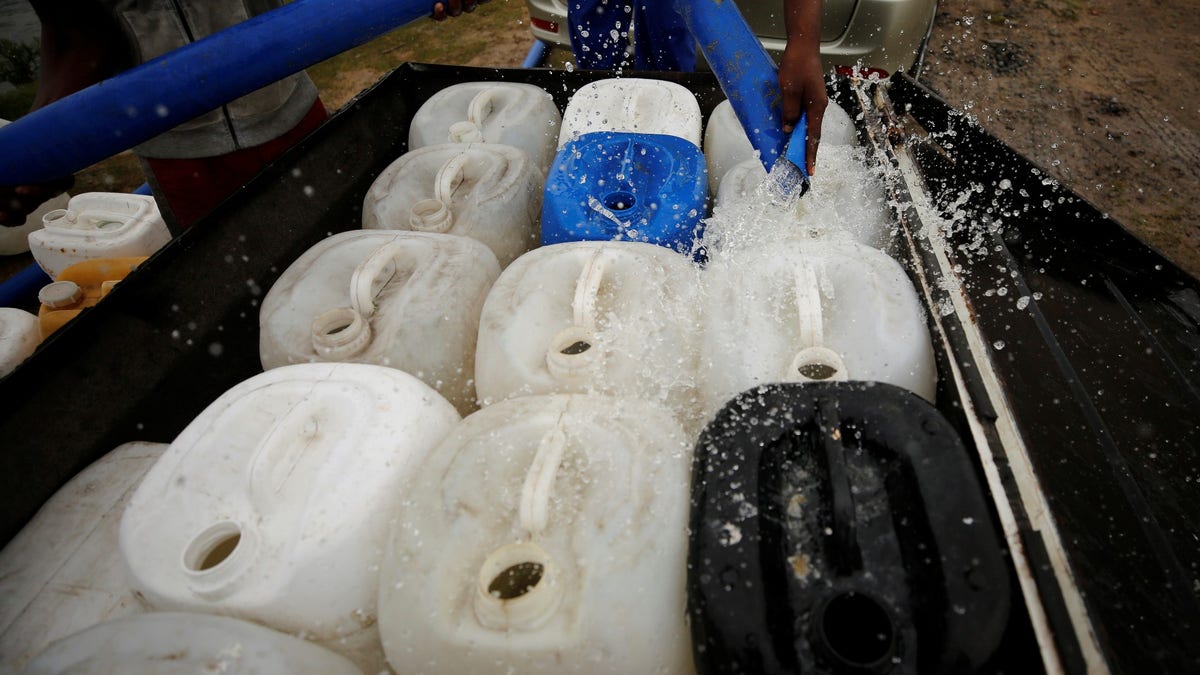
FILE -- Residents fill containers with water from a polluted river in Cape Town, South Africa, February 2, 2018. (REUTERS/Mike Hutchings)
Thursday is World Water Day, created by the United Nations to focus attention on the importance of preserving our planet’s freshwater supply. If you’ve heard about the global water crisis affecting 844 million people, you might figure that anything you can do about it would be, well, a drop in the bucket. You’d be wrong.
The reluctance to sink hard-earned money into an effort that seems too big and too intractable is understandable. But here’s what I want you to know: The global water crisis is beatable. And it’s actually the perfect time to invest in solutions to water scarcity. The entire international community is focused on cracking this nut.
And I can tell you where you’ll find your best bet: Rwanda, where I’ve been this week.
About the size of Maryland, Rwanda is likely to be the first sub-Saharan African country to achieve one of the biggest, most audacious goals for a developing country: universal access to clean water. It’s a stunning prediction given that genocide in 1994 left Rwanda as good as dead.
Clean water is a key component in Rwanda’s remarkable return to life. President Paul Kagame’s government is committed to providing clean water for everyone in the nation of 12 million people by 2024.
That’s a big part of why I chose to jump on that bandwagon with my organization, World Vision. We, too, have a big goal – we’re aiming to provide clean water for everyone in our project areas worldwide by 2030. Rwanda, we believe, is where we will first finish the job.
When it comes to investing hard-earned resources, World Vision is not so different than you. We’re looking for big impact. We want to bet on winners.
Rwanda is a good bet on the African continent right now. The other day I had lunch with Theogene Manzi, the vice mayor of Gatsibo, a water-scarce district in the Eastern Province. He described the robust goal-setting at all levels of the country, rolling up to the president, and the scrupulous accountability of government offices. In fact, as we met, he said the national auditors were still at work back in his office, scrutinizing the use of the district’s budget.
Manzi knows exactly how many people lived in poverty in his region – more than 6,000 – and he explained that it’s hard work to help lift those citizens out of poverty to enjoy education, better shelter, and of course, clean water and sanitation. “We don’t sleep,” he said, only half-joking.
I like people who care so much about fighting poverty that they’re willing to lose a little sleep over it.
In my experience, key partners like governments can make or break success in a country. A good relationship is akin to the wind blowing at our backs, enabling us to move forward swiftly together. There are many places where it seems that the wind is in our faces – where the government is corrupt or uncooperative, impeding our progress. In Rwanda, our goals are well- aligned.
The week’s highlight was an exuberant celebration of the opening of a 6.8-kilometer clean water pipeline in Gicumbi, in the Northern Province, built by a partnership of World Vision, the district government, and the Water and Sanitation Corporation. The pipeline will benefit 8,000 people in 14 villages.
Among speeches by local dignitaries and me, the most profound words were from a schoolgirl, who said: “Do your part to maintain this. Clean water is a gift from above.”
From what I’ve observed, I’m convinced that Rwanda is where we will see history happen. We will witness victory over the scourge of water scarcity in the nation – not just in my lifetime, but in the next few years.
That’s why I’m making it personal. In my last year as World Vision president I’m committed to raising $30 million to finish the job – to provide water to everyone throughout World Vision’s project areas. It’s a goal that aligns perfectly with Rwanda’s national strategy.
Here is a country that teetered on the brink of extinction only 24 years ago – only to fight back, defy the odds, and dream big for a better life for future generations. That’s a miracle I want to be a part of. How about you?
